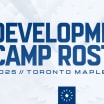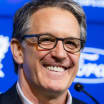Transcript: Morgan Rielly Media Call - April 2, 2020

© Mark Blinch/Getty Images
Q (Paul Hendrick, Leafs Nation Network): Thank you, Leafs Nation Network, Morgan, good to hear your voice upcoming here. We know we've all been going through the viral situation; I'm just going to go right to hockey. Looking back to your first few years in the National Hockey League, how did defenseman like Travis [Dermott], Rasmus [Sandin] and Timothy [Liljegren] excel in the big picture because of the experience they had so early in their careers? And maybe you can include Justin [Holl] in that group as well.
MORGAN RIELLY: Paul, thanks for your question. I guess to start off, I think that if you look at those players that you mentioned, I think that for me it really jumps out that they can all really skate. I think that helps and I think that when I look back at my first couple years, I think that I really had to rely on that, and I think that those guys will move very well. I think when you look at Travis and Rasmus, Timmy, then you said Hollsy as well, I think that they all were playing really good hockey up until the pause in the season and I think that the most impressive and most encouraging thing about that is that they improved massively over their time. If you look at Hollsy, the jump that he made from last year and then Dermy as well, if you look at how much he was playing in the games prior to the pause, I think that was very impressive. And then Timmy and Rasmus having a smaller sample size, but still really having improvements shown and just being comfortable around the guys is half the battle as well. I know for me, I came into a bit of an older team, but I think that the room environment and the leadership qualities of the older guys make them a bit more comfortable and I think that's helpful. I think that if you watch the way that they played and improved over their time with the team, I think that was all positive. I really look forward to watching them grow as players.
Q (Lance Hornby, Toronto Sun): Hi Morgan, thanks for doing this. No escaping what's going on in the world right now, can you tell us where you are, how you're coping and how your family at large is doing?
MORGAN RIELLY: Thanks, Lance. I'm back in North Vancouver right now, been here for a little while. I think you're exactly right. There's no escaping it and it's a strange time for everyone and I think that, to answer your question, I think it's been challenging at times for coping, but I know that we're all experiencing that. And I think you have to keep that in mind that we're all in it together. Nobody is really prepared to do the quarantine and experience this much alone time and downtime, if you will. But I think for me, personally, I've just been trying to keep in touch with teammates and friends and family and do some home workouts and just try to keep your mind busy. And, like I said, that can be challenging at times, when you're at home for days at a time, but, like I said, we're all dealing with it and we all have our own ways of doing it. And I mean, for me, it's been important just to have a routine and try to create a schedule just to keep yourself on pace to maintain a little bit of fitness. I mean, whether that's a home workout in the morning, then read something and just try to keep yourself busy. I'm still working at it. I certainly think that I can do a better job of maintaining my schedule, but I think that's been my thing. It's just been trying to keep yourself on track and I think that's been home workouts in the morning, make some phone calls, read something and spend some time at home. Like I said, it's challenging, but we're all going through it, so I think it's important to keep that in mind.
Q (Lance Hornby, Toronto Sun): Quick follow up, Morgan, if you don't mind. How difficult was it for you to have battled back as long as you did from the injury, then play one game, then have to sit again? Does that make it more difficult for you to go through what you're doing now?
MORGAN RIELLY: Yeah, it was certainly a long process of trying to heal and trying to keep yourself in shape during the injury of a broken foot. Eight weeks goes by and you're really working hard just to get back and then to come back and play one game, it's certainly not ideal. But in that same breath, I think that if I hadn't come back and played one game, and I still hadn't played since January 12, I think it would make it worse. I think you have to take the positives when you can. I'm certainly happy that I came back and played one game and we won. I think if you look at the big picture, I think you have to just be happy that you got one game in, but you're certainly right. When you're training in the gym, and you're trying to get back to play, you're picturing playing 12, 13 games and playing playoffs, not playing one, then taking a pause again. So it is what it is. But again, I think you have to take the positives. I'm happy I played one because I think I'd be going crazy if I hadn't played since early January.
Q (Dave Feschuk, Toronto Star): Hey Morgan, Dave Feschuk from the Toronto Star. You mentioned you were doing some reading. Maybe you could tell us a little bit about what you've been reading or watching? Specifics always welcome.
MORGAN RIELLY: Hey, in terms of watching, I don't really have anything in terms of TV shows that I've been watching, but just trying to stay up to date on movies and stuff. I watched a movie last night called Queen and Slim. I thought it was pretty good. But in terms of reading, I'm pretty much open to just about anything. I just read Shoe Dog, which I liked a lot. I'm on one right now about mental health a little bit that a few members of the team got. I think that's helpful, I think, especially given the times, just to change your perspective a little bit. Then I just read a book not too long ago called Educated, which I really liked as well. So I'm always open to options, and I think that's a good way just to keep your mind stimulated and, just given all the downtime, I think it's important to try to make use of it. Workouts, movies, reading, TV shows, all that stuff can help. It's certainly a strange time. That's what I find has been helpful for me.
Q (Dave Feschuk, Toronto Star): Just a follow up -- the mental health book you're talking about, did the team distribute it? Is that right? Do you know the name of it?
MORGAN RIELLY: Well, each player over time, if you've played for Kyle [Dubas] long enough, he's probably given you a book. So I think that it was different for each guy. I probably won't give the name of it just because I think it was personal and but it's not anything that's too serious. I think he just likes it when you're reading something and I'm enjoying it and, like I said before, if you've worked under Kyle for long enough he's probably given you a book that at one point or other, whether it's Christmas or at the end of the year, something like that. So, that's all it is.
Q (Josh Clipperton, The Canadian Press): Thanks for doing this. I'm just wondering if there was a moment that this really hit home for you, whether it was the locker room restrictions or obviously the day of the pause or something you've seen on TV or something in your personal life that really brought this all home.
MORGAN RIELLY: I think for me personally it's changed over time. Obviously, Wednesday night, I believe it was March 10th or 11th, I was at home just getting some treatment and I was watching a basketball game on TV. Then the news kind of broke that night and then we were supposed to play on that upcoming Thursday and you go to the rink in the morning and you start talking as a group and you try to just put your finger on what's happening and then you get told to go home so it became pretty real that morning. Then about two o'clock in the afternoon when the League paused the season, it became real then. Then I think it just kind of changes over time, that day you go out for groceries and you realize that you have to get to the grocery store early enough in the morning so you can actually pick something, it becomes that much more real then too. Just as time has gone on, it has become more and more real. Each day when there is a news break, or you try to go to the grocery store, and you realize there is a lineup outside - it's just strange times. I think each day you have to stay positive, do your part and keep yourself inside. To answer your question, I don't think that there is really any one moment that really stands out, but I think almost every week when there is a new news break or new experience that you have like when you go to the grocery store, it's scary but, again, we're all in this together and we all have to do our part and right now that's keeping yourself at home. That's all I'm trying to do anyway.
Q (Josh Clipperton, The Canadian Press): If I could just ask a quick follow up, just switching to hockey. Lots of stuff happened on and off the ice in these 69 or 70 games you guys played, have you had a chance to sort of reflect on the games you guys did play and the season as a whole for the team?
MORGAN RIELLY: Yeah, I think so. During a pause like this you have lots of time to process what happened over the course of the year so far. You look back, reflect and picture things going differently, I think. What you like and what you didn't like about it. I think this is a really good opportunity for players to do some thinking about that kind of stuff. I think it's hard not to do, especially when you get in touch with people from the team and talk about the year. You're also focused on trying to keep yourself in shape in the event the year resumes and you start playing again. So I think it's a mix of trying to keep yourself focused and also doing some reflecting. I guess to answer your question, we've done some reflecting and talking as a team, to teammates and friends, but at the same time, you still want to be motivated and prepared to start playing when that time comes.
Q (Dave Feschuk, Toronto Star): Just looking back on the year you had with obviously the broken foot and then you spoke about some other pain you were going through before the broken foot. When you look back on it what goes through your mind about why it didn't go as well as you would have liked?
MORGAN RIELLY: When I look back at the injury on the foot, that's just kind of one of those things where you don't have complete control over it and that's a bump in the road over the course of a long year that people go through all the time. It's obviously not what you want when you prepare for a season. When you're in it, you try to stay healthy and try to do what you can to keep yourself in the lineup and that was obviously not expected to miss eight weeks, but I think that's a bit out of my control. So I think you have to do your best to rehab and try to get healthy and I think I did that. As far as the other parts to the season, I think there were times where it was good and there were times where I think I could have felt better and I think that is a bit of how we as a team look back at the year and the games that we did play. Both myself and the team would like to be more consistent and I think that's a goal for us moving forward. That's my job as an individual to be prepared and be consistent and, as a team, I think we certainly had our ups and downs and as a group we want to be more consistent than we were this year. I think that goes for both myself and the team as a whole.
Q (Marty Klinkenberg, The Globe and Mail): Hi, Morgan. I'm glad you're doing well. I'm just wondering if you have found yourself doing anything in particular that you've never done before? Ryan Getzlaf built a chicken coop, right? Leon Draisaitl has started doing puzzles. Have you found yourself in this territory?
MORGAN RIELLY: I've been cooking a lot more than I do normally, which I suppose is new, and I've enjoyed doing that. I've certainly done some puzzles and watched some TV shows I wouldn't normally watch. I haven't really done anything to out of character. When it comes chicken coops and whatnot, I haven't gone there. It's more about everyday life, the first thing that really jumps out is cooking, we've been cooking every meal. That's new to me. Normally, you'd eat at the rink or go out for dinner if you're on the road, so just being home and cooking more, I think that's been good. Just being inside for this long at one time, it's all new territory for all of us and I think you have to do what you have to do in order to keep yourself in a good state of mind. I think for me, like I said earlier, that's been doing some home workouts and just being here, just trying to keep your mind busy and that can come in a lot of different forms. I think we're all doing stuff that is new to us and I think it's important that we keep working to keep ourselves in a good state of mind. It's challenging at times, but if you put your mind to it, I think you can do it.
Q (Luke Fox, Sportsnet): Hey, Morgan, thanks for doing this. First of all, what's your specialty in the kitchen?
MORGAN RIELLY: My specialty in the kitchen… I'm still working on it, but we've been barbequing chicken and steak, and then doing some pasta and stuff. The only thing that I haven't gotten to, that I don't have the confidence for yet is fish. I don't want to undercook it, because then you've got a whole other situation on your hands. Just mostly on the barbeque.
Q (Luke Fox, Sportsnet): On the hockey side of things, how late do you think is too late to squeeze in playoffs? At what point do you need to focus on the next season? I know hockey players are creatures are habit.
MORGAN RIELLY: That's a good question. I think that's what we're all wondering right now. I guess a quick answer is I don't know. I can tell you that we do have calls as a team and as players around the league and we talk about those sorts of things. A point comes where it's not really in our control, but I guess the question is how late is too late? I don't know. As players, we all want to play and have a chance to play in the playoffs, but health comes first, there's no question about that. We're kind of in a holding pattern a little bit because we're trying to do what's best for general health, for people everywhere - this is obviously much bigger than hockey. So, I don't really have a good answer to your question. I can just tell you that the players miss playing, they want to play and it's certainly strange not being out there. At this point, I think we have to do what's best for the general health and the bigger picture and just continue what we've been doing. Hopefully a time comes when we're all back out there and healthy and it becomes a normal life again, but when that happens? I'm not sure.
Q (Lance Hornby, Toronto Sun): Obviously, your social life is getting a lot of attention from fans online. Just wondering how that's going and what it's like having someone in your life who obviously shares your passion for skating and is comfortable in the public eye?
MORGAN RIELLY: Not too much has changed there to be honest. I mean, we're both just kind of in it together. We're trying to keep each other sane. We're doing what we can to do our part and just quarantine in. I really won't talk about it too much, but I'll just say that I'm glad I'm not alone because I think that can be challenging so I think it's important to keep in touch with those people in your life that you know who are alone right now. It can be tough at times, so I think that's important for all of us to do.
Q (Josh Clipperton, Canadian Press): I know you did the handwashing video [on Maple Leafs social media] at the start of this, Kyle [Dubas] has done a video, Auston Matthews talked to SickKids yesterday. I'm just wondering what you see as a social responsibility as someone in the public eye in times like these to get the messages out. I know the Prime Minister again today said Canadians are not staying inside enough. I'm just wondering what you think the responsibility is for you guys. You guys have obviously already taken the lead in some respects.
MORGAN RIELLY: I think that when it comes to that you have to be a bit careful because you don't want to do too much, and you don't want to make the situation about being on social media. I think, in my opinion, really the best thing you can do is lead by example. Right now, like I said earlier, I think that's keeping yourself inside and being true to the quarantine. I think that's really the best thing you can do. As it comes back to the handwashing video, that was a team outlet on their Instagram and Twitter and it really feels like a long time ago. For me personally, I think that the best thing we're able to do is to keep ourselves inside. I do understand that playing hockey in Toronto you do have an opportunity to be a leader in the community and I think it's important that we all realize how important that is. Like I said, I don't think this is about being on social media and preaching to people. I think it's about leading by example, keeping yourself inside and doing your part within the community. As players, we talked about that. We talked about the difference that we're able to make, but I think at the end of the day it's most important to keep ourselves inside and lead by example on that front.
Q (Dave Feschuk, Toronto Star): You talked about the up-and-down nature of the season. Kyle [Dubas] termed you guys a 'Jekyll and Hyde' team near the end there. When you reflect back on it, can you put your finger on things that led to that or have led to your team having those characteristics?
MORGAN RIELLY: I can't really put my finger on it. I think if you look back at what Kyle talked about when he did media, he was open about it that he didn't have an answer either. I think that as a team, it's important that we use this downtime to really take a look in the mirror. As players, we all have to be better, but I think that if you look at the ups and the downs it's obviously not how you want your year to be described. You want it to be a bit more consistent but with the bad, there's always good. I thought that we answered the bell at times when we had to against some pretty good teams. Obviously, the downs being the games where you're supposed to win, or you would expect a good team to be able win and we weren't able to execute that. I guess to answer your question, I can't really put my finger on it, but I think you have to keep in mind that there were positives over the course of the season. When hockey does resume, I think we know that we have to be better and we have to be more consistent and I think that this time is important for the players to really think about that and know what's at stake. That's not a great answer because I can't put my finger on it, but I think that's how we all feel. Deep inside you have to take it personally and be better yourself and just help the team be more consistent.
Q (Dave Feschuk, Toronto Star): Before the broken foot, you had some other injury issues that plagued you through the year. When you look back on that, how much of that was responsible or contributed to your play and how are you feeling now?
MORGAN RIELLY: I don't really think it was a controlling factor in my ability to play. I think if you polled each team, each team has injuries, guys go through injuries. I really didn't try to up-play it and make it anything that it didn't have to be or any excuse or anything, but right now during this downtime I think it's important for players everywhere to take care of their bodies and try to use this to their advantage a little bit. For me, I feel good. There's no question that after I came back from the broken foot, I felt good. To play one game is a small sample size but at that time my body felt good and I think that it's important that we all use this time to keep our bodies healthy and in shape, and that's all I'm trying to do right now at home is make sure when the time comes to start playing again, I'll be ready. I know that the rest of my teammates are doing the same, so I think that's important right now, to try and use this time to our advantage a little bit.


















